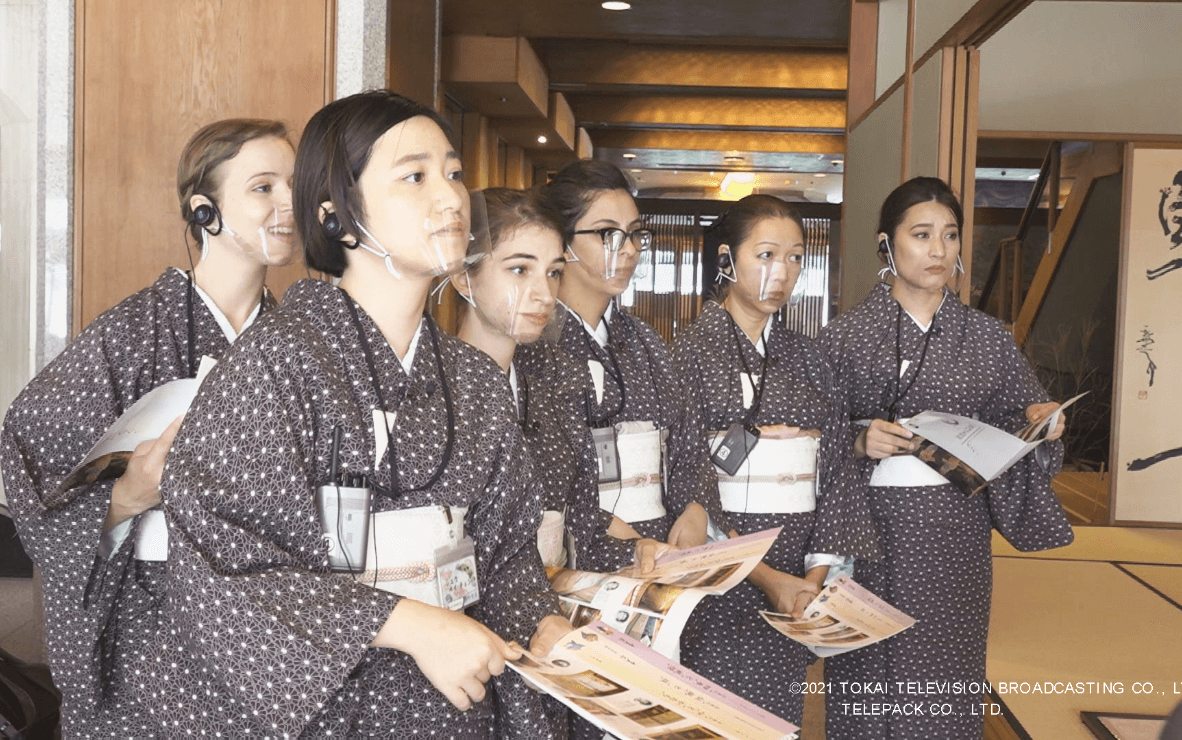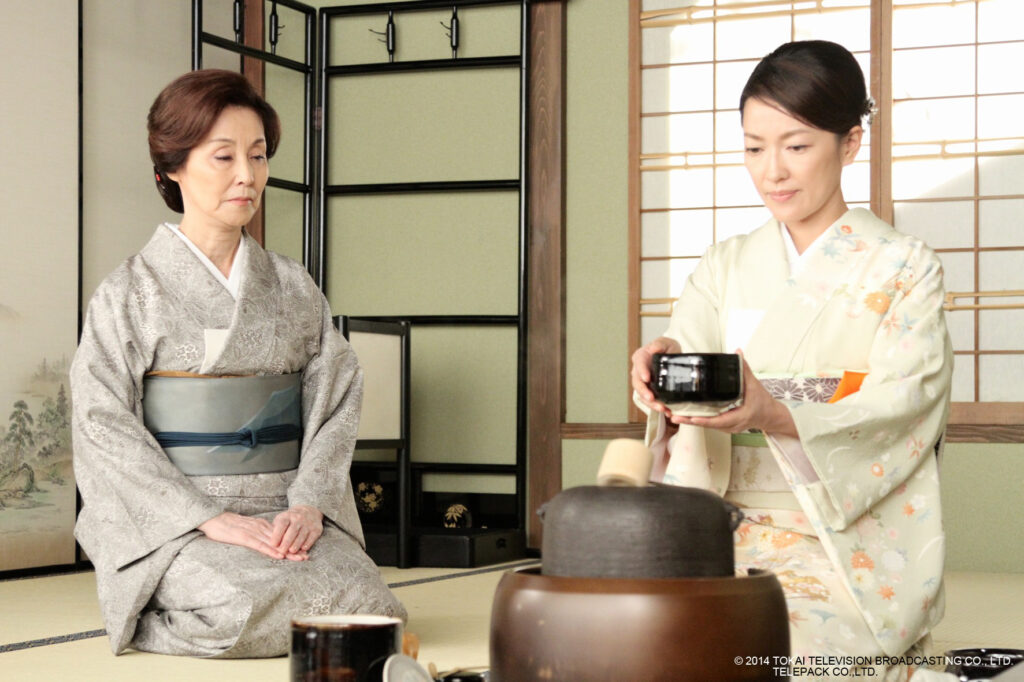2022.10.12
CULTUREDrama, Animation, Documentaries . . .
Sharing the Spirit of Japan with the World through TV

Tokai TV and the Japan Foundation co-produced “The Japanese Hospitality Challenge: Bride and Pride Spin-off,” a documentary about six foreigners who try their hand at being serving staff at a ryokan (Japanese-style inn). The competitors, hailing from Mexico, the Philippines, Spain, Taiwan, the U.S., and Uzbekistan, were selected from among more than 100 applicants. Although they clash at times, they grow closer too.
Television has been highly instrumental in introducing Japanese culture. The Japan Foundation is providing TV programs overseas to bring people in Japan and around the world closer together.
The Japan Foundation (JF) has been offering Japanese TV programs to countries and regions with limited opportunities to access Japanese content. For nearly 40 years, JF has been undertaking these efforts to effectively introduce Japanese culture to a wider audience and has provided a total of over 5,000 TV programs to more than 170 countries and regions. These programs have been winning Japan a lot of fans, even in countries previously unfamiliar with Japanese culture.

A ceremony for the handover of TV programs from Ambassador MIZUUCHI to Minister of Information and Media, Ms. Chushi Kasanda at Zambia’s state-run broadcasting service ZNBC in 2021. Courtesy of the Embassy of Japan in Zambia
“Oshin” and “Hanayome Noren (Bride and Pride)” Have Worldwide Popularity
“Oshin” is one of the most popular Japanese TV programs around the world. JF helped to translate it into many languages, having made the program available in about 70 countries. The main character, Oshin, who was born and raised in a farming village in Japan’s north-eastern Tohoku region and who lives an earnest life despite numerous hardships, won viewer’s hearts worldwide. The popularity of the program in some countries was even called “Oshin Syndrome.” When the scriptwriter, HASHIDA Sugako, passed away in 2021, many people overseas mourned her passing, demonstrating once again the widespread appeal and deep-rooted popularity of Oshin.
Even in recent years, some programs provided by JF have become international hits. These include the daytime drama series “Hanayome Noren (Bride and Pride),” which began airing in Japan in 2010. The series, in which a conflict between a bride and her mother-in-law unfolds in a long-established ryokan inn, has been broadcast in about 20 countries and regions and has gained massive popularity. “I never expected such a strong overseas response to a drama series about the relationship between a woman and her mother-in-law. Perhaps these are common concerns that transcend language and culture,” reflects Mr. ICHINO Naochika, head of the Tokyo Production Department of Tokai Television Broadcasting (Tokai TV), who was responsible for the production. “After all, people can relate to the concepts of kindness and compassion that the series explores. I believe that the feeling of wanting to care for others is something the whole world can understand. Also, when I learned that JF was helping these programs gain viewership in countries where we never expected them to be broadcast, it sparked my interest. I enjoy knowing who is watching our programs in which situations and where. As a drama producer, I find it very rewarding.” In 2021, in response to high levels of support overseas, Tokai TV and JF jointly produced the documentary “The Japanese Hospitality Challenge: Bride and Pride Spin-off.” In this documentary, six non-Japanese women take on the challenge of training as serving staff at the traditional inn in which the drama series is set.

Set in a long-established traditional ryokan inn, the drama “Hanayome Noren (Bride and Pride)” depicts the battle between a former career woman and her traditionally minded mother-in-law. In Japan, 205 episodes across four seasons were broadcast between 2010 and 2015.
Many Japanese medical dramas have also become huge hits. “DOCTORS: The Ultimate Surgeon” starring Mr. SAWAMURA Ikki, which was provided to foreign countries as part of the JF project, became incredibly popular in Kazakhstan. Mr. Sawamura also had a positive response to the international viewership, saying, “I was surprised that it gained such popularity in a country with a different medical system and environment. All the creators and I put a lot of work into the program, so I am very honored. There are many comical exchanges between Drs. Sagara (played by myself) and Moriyama (played by TAKASHIMA Masanobu), but I’m glad that viewers also feel the empathy and hope conveyed by the doctors when they must confront the issues faced by their patients.”

The popularity of “DOCTORS: The Ultimate Surgeon” in Kazakhstan was so great that one of the country’s magazines ran a multi-page feature on the show.

Mr. SAWAMURA Ikki, star of “DOCTORS: The Ultimate Surgeon,” says, “As Japan’s role in the world is changing these days, I feel that we can learn a lot from how people overseas react to Japanese dramas about what we should cherish in our lives.”
In some cases, programs offered by JF have had an unexpected impact. From 2006-2007, JF offered an Arabic-language version of “Captain Tsubasa,” an anime focusing on football, to local TV broadcasters in Iraq—where the sport is immensely popular—during the country’s postwar reconstruction period. Fifty-two episodes were broadcast, in which the main character, OZORA Tsubasa, becomes a professional soccer player and builds friendships with the world’s top players while competing against them. Previously, the program had been broadcast via satellite only, but at that time, few households in Iraq had access to satellite broadcasts. When JF secured the anime’s terrestrial broadcasting, we were able to share a world of hopes and dreams with more viewers, especially the children who will go on to take responsibility for the future of the Middle East. Up to 2009, Japanese Self-Defense Force units were dispatched to Samawah, Iraq, to provide humanitarian and reconstruction assistance. They traveled around the region in water trucks decorated with large “Captain Tsubasa” stickers. This animated program became the face of Japan and played a role in facilitating local activities.
Local TV Stations as Points of Contact for Introducing Japanese Culture
The introduction of Japanese TV programs by JF has proved to be very useful for overseas TV stations. On Canal 22, a national broadcasting service in Mexico, about 7% of broadcast programs feature at least some Japanese content supported by JF. Mr. Eduardo Nava, Director of Programming at Canal 22, says, “Especially popular are TV drama series such as ‘Carnation’ and ‘Gochiso-san Bon Appetit!,’ as well as documentaries that show Japanese qualities throughout—for example, street scenes of Kyoto. Anime programs are very popular not only with children, but also with adults. We schedule anime programs at a later hour so that adults can also watch them,” he says. “Aspects of Japanese culture such as the scenery, nature, architecture, clothing, culinary customs and music that are so different from Mexico’s have a lot of appeal. Watching a TV series offers us a glimpse into the daily life of an average Japanese family and what they usually eat. For most Mexican viewers, Japan is a distant place which they won’t have an opportunity to visit themselves, so I feel responsibility and am happy that we, as a TV station, can be a window into Japanese culture.”
Feeling moved by the same story or being exposed to different cultures through television can help bring distant countries and Japan closer together. Japanese TV programs are sure to continue playing a major role in the exchanges between Japan and the rest of the world.
